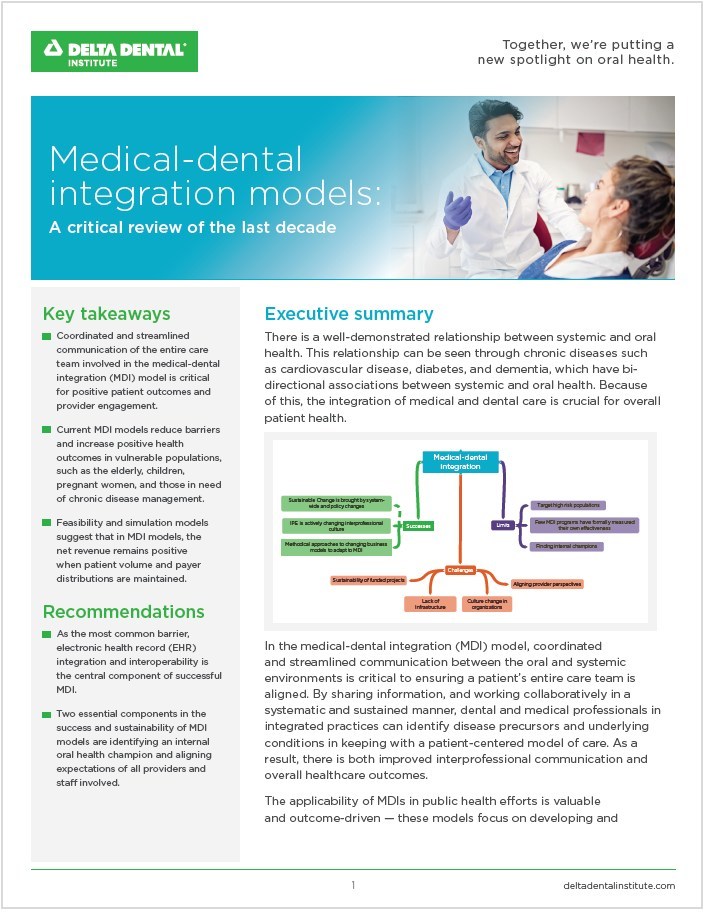Increasing communication between dental and medical providers reduces barriers to care. According to a new report from the University of Colorado School of Dental Medicine, Medical-Dental Integration (MDI) improves positive health outcomes in vulnerable populations, such as at-risk children, pregnant women, seniors, and those in need of chronic disease management.
Dr. Tamanna Tiwari, assistant professor in the department of community dentistry and population health at the University of Colorado School of Dental Medicine on the Anschutz Medical Campus led the review of MDI models over the last decade.

University of Colorado School of Dental Medicine report finds medical-dental integration models can improve overall health care outcomes in vulnerable populations. The review, funded by the Delta Dental Institute, indicates streamlined communication and care team collaboration and adaptability are best practices for positive patient outcomes.
“The review finds that in an MDI model, coordinated, streamlined communication and collaboration among the entire care team is critical for positive patient outcomes and provider engagement,” Dr. Tiwari said. “Identifying creative ways to adapt to specific situations may help increase access to oral health screenings, diagnosis and referral of patients for chronic disease management. This has the potential to reduce the number of appointments and providers a patient must interact with, which increases the likelihood that patients will receive critical preventive care.”
The Delta Dental Institute funded the report, which supports the research-based exploration of care delivery models like MDI that improve health care outcomes and advance patient-centered care.
“Oral health is a critical component of whole person health,” said Joseph Dill, DDS, MBA, Head of Dental Science at the Delta Dental Institute. “Care delivery models that rely on collaboration and integration between primary and dental care teams, when implemented successfully, can create more inclusive approaches that help the health care system work better for everyone.”
Key takeaways from the report include:
- Best practices for implementation
- Coordinated and streamlined communication, collaboration, and adaptability among the entire care team.
- Electronic health record (EHR) integration and interoperability.
- Using warm hand-offs and emerging technologies, such as telehealth and teledentistry, to coordinate care, manage complex patients, and close referral loops.
- Recommendations for the sustainability of integrated services
- Train medical professionals on oral health care, maximize the contribution of dental professionals, and increase diversity and cultural competency of care teams to achieve long-term viability.
- Achieve better health outcomes at lower costs by implementing MDI’s value-based care model, which aligns health care systems, patients, and providers.
- Maintain net revenue positivity through MDI models that sustain patient volume and payer distributions. by coordinating
- Snapshot of successful care models
- There is no single formula for the success of an MDI model; adapting to specific situations and finding creative ways to maximize success are crucial to continuing the evolution of integrated care.
- The co-location of services model can improve coordination of care, which improves access to oral care, dental referrals, and preventive procedures. This model does not require full integration to be successful.
- The fully-integrated care model involves the use of electronic health records (EHRs) and collaboration of providers to improve services to patients, which creates diverse referral relationships with dentists and can use strategies like teledentistry to improve access to care.
Dr. Tiwari will present her report discoveries at the Interprofessional Collaborations to Improve Oral Health poster session on November 7, 2022, during the American Public Health Association’s Annual Meeting.
About the Delta Dental Institute
The Delta Dental Institute is dedicated to advancing oral health for all Americans in partnership with the Delta Dental companies and dedicated partners across the country. With expertise rooted in Delta Dental’s rich history of oral health leadership, we engage in and support oral health research, community outreach, and advocacy, striving to ensure that everyone understands the importance of oral health to overall health and has access to the care they need.
Visit deltadentalinstitute.com for more information.
About the University of Colorado School of Dental Medicine
The only dental school in the Rocky Mountain region, the University of Colorado School of Dental Medicine, is a leader in innovation. The school has five incredible dental programs, including three residencies and eight clinics on the Anschutz Medical Campus. Students learn in all dimensions, from virtual reality to the real world. The school provides inter-professional experience, research activities, and patient care. Patients can get quality care from our esteemed faculty, staff and students.
Additional information about the school: https://dental.cuanschutz.edu/.
About the University of Colorado Anschutz Medical Campus
The University of Colorado Anschutz Medical Campus is a world-class medical destination at the forefront of transformative science, medicine, education, and healthcare.
The campus encompasses the University of Colorado health professional schools, more than 60 centers and institutes, and two nationally ranked hospitals treating more than 2 million adult and pediatric patients yearly. Innovative, interconnected, and highly collaborative, we deliver life-changing treatments, patient care, and professional training and conduct world-renowned research powered by more than $500 million in research awards.
For more information, visit https://www.cuanschutz.edu.












